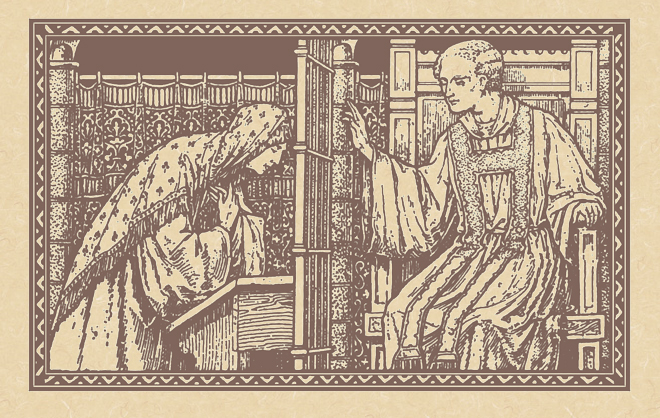Silence Isn't Always Golden.
The Fourth Thursday of Lent; and, [in the United States] the Commemoration of Saint Katharine Drexel, Virgin.*
Lessons from the feria, according to the ordinary form of the Roman Rite:
• Jeremiah 7: 23-28.
• Psalm 95: 1-2, 6-9.
• Luke 11: 14-23.
The Fourth Thursday of Lent.
Lessons from the feria, according to the extraordinary form of the Roman Rite:
• Jeremiah 7: 1-7.
• Psalm 144: 15-16.
• Luke 4: 28-44.
The Fourth Thursday of the Great Fast; and, the Feast of the Holy Martyr Eutropius & His Companions, Cleonicus & Basiliscus.
Lesson for the Sixth Hour with Holy Communion,** according to the Ruthenian recension of the Byzantine Rite:
• Isaiah 28: 14-22.
FatherVenditti.com
|
 8:48 AM 3/3/2016 — We've noticed many times how sickness is often a Biblical allegory for sin, and we seem to revisit the issue whenever we read about our Lord performing one of His many cures. That shouldn't cause us to fall into the mistake of thinking that the cures are not real;—they are actual historical events that the Evangelists have recorded for us—but, they are highly symbolic as well, and the Evangelists accentuate them not simply to show our Lord's divinity, but because of their allegorical value. The Jews of our Lord's time, remember, regarded physical handicap as a sign of God's displeasure: a person was blind or deaf or lame or, in the case of the man described in today's Gospel lesson, mute because he had sinned or, if he was born that way, because of a sin inherited from his parents. Remember, when our Lord encountered the man born blind, His own disciples asked him, "Rabbi, who has sinned, this man or his parents, that he should be born blind?" (John 9: 2 Douay-Rheims). And the cures that Jesus brings about on these occasions, in addition to simply being done to help someone in need, are most definitely intended by our Lord to represent the spiritual healing that He comes to effect in our lives. 8:48 AM 3/3/2016 — We've noticed many times how sickness is often a Biblical allegory for sin, and we seem to revisit the issue whenever we read about our Lord performing one of His many cures. That shouldn't cause us to fall into the mistake of thinking that the cures are not real;—they are actual historical events that the Evangelists have recorded for us—but, they are highly symbolic as well, and the Evangelists accentuate them not simply to show our Lord's divinity, but because of their allegorical value. The Jews of our Lord's time, remember, regarded physical handicap as a sign of God's displeasure: a person was blind or deaf or lame or, in the case of the man described in today's Gospel lesson, mute because he had sinned or, if he was born that way, because of a sin inherited from his parents. Remember, when our Lord encountered the man born blind, His own disciples asked him, "Rabbi, who has sinned, this man or his parents, that he should be born blind?" (John 9: 2 Douay-Rheims). And the cures that Jesus brings about on these occasions, in addition to simply being done to help someone in need, are most definitely intended by our Lord to represent the spiritual healing that He comes to effect in our lives.
Keeping this clearly in mind as we read the Holy Gospels, we cannot help but notice that, in the way Jesus acts toward the sick, He is giving us an image of the sacraments. St. John Chrysostom, commenting on today's Gospel lesson, tells us that this man “was unable to present his request himself, because he was dumb; he was unable to ask others to do it either, because the devil had tied his tongue, and together with his tongue he had bound up his soul” (Homilies on the Gospels, 32, 1).
How many times have we left the confessional only to remember later that there was something we needed to say to our Lord, but had forgotten to say it? More common, perhaps, is the phenomenon rooted as much in psychology as in spirituality, wherein someone will go to confession with every intention of making a clean breast of everything, but simply can't get it out: maybe they're embarrassed; maybe the sin occurred in the midst of some traumatic experience that the individual finds difficult to relive; maybe it's just been so many years since someone confessed that he's afraid of what the priest will say, forgetting that he's not telling his sins to the priest, he's telling them to Christ. Priests I know who work in the Marriage Tribunal of our diocese tell me that one of the reasons petitions for decrees of nullity often take so long to process and bring to judgment is not because of some kind of slowness on the part of the Tribunal, but because the petitioner often takes a long time to collect the necessary information, because part of the process requires them to put down on paper, in excruciating detail, all the horrors that brought about the dissolution of the marriage, and people have a hard time plowing through the emotions required to do that; no one wants to relive the most heart-breaking part of his or her life.***
In today's Psalm, we all prayed:
Oh, that today you would hear his voice:
“Harden not your hearts as at Maribah,
as in the day of Massah in the desert,
Where your fathers tempted me;
they tested me though they had seen my works” (Psalm 95: 8-9 NABRE).
The historical reference is to events recorded in Exodus 17 (cf. v. 7); but, the meaning in the context of today's Mass is not a hardening of one's heart as a result of obstinacy; it's a hardness brought about by a lacking in the virtues of Faith and Hope: we either doubt the Truth of the Faith, that Christ can and does forgive our sins in confession, or we presume against our Lord's infinite mercy and doubt our Lord's desire to do so. And here is where the Devil comes into play, and why so much is said about him in today's lesson: the result of this fear and presumption is silence, preventing us from going into the confessional at all, or, once we're in there, preventing us from speaking what needs to be spoken. This, of course, serves the Devil's purpose, because a sin not confessed is a sin not forgiven.
Now, it is a fact that, if our emotional state is such that we fail to speak a sin in confession because we simply can't muster the courage to do it, our Lord, who knows all our sins from the get-go, makes up for that handicap and forgives the sin anyway, which is why it's not necessary to run back to confession the next day or the next hour to try it again; it's simply sufficient, the next time one goes to confession, to mention what happened. And it doesn't matter how long it's been, or how terrible we think the sin may be. “Come back to the Lord your God,” says the prophet Joel; “he is ever gracious and merciful, ever patient and rich in pardon; threatens he calamity, even now he is ready to forgive” (Joel 2: 13 Knox).

* Today is what the Roman Missals refer to as "Thursday of the Third Week of Lent." Cf. the post here for an explanation of how the days of Lent are identified on this site.
Katharine Drexel was a Philadelphia heiress and foundress of the Missionary Sisters of the Blessed Sacrament. She established some forty-nine foundations, including Xavier University in New Orleans, before her death on March 3rd, 1955, as the age of ninety-seven. She was canonoized by Pope Saint John Paul II on October 1st, 2000.
** In the Byzantine Tradition—as in most Eastern Christian traditions, both Orthodox and Catholic—the Eucharist is not celebrated on the weekdays of the Great Fast. In some traditions, the faithful are expected to fast from the Blessed Eucharist during this time, abstaining from Holy Communion except on Saturdays and Sundays.
In other traditions, including the Ruthenian recension, Holy Communion may be distributed to the faithful daily provided that the Divine Liturgy is not celebrated. On Wednesday and Friday evenings, the Divine Liturgy of Presanctified Gifts is celebrated, consisting of a form of Solemn Vespers coupled with a Communion Service in which the Eucharist confected on the previous Sunday may be received by the faithful. On the other weekdays, another service—usually the Sixth Hour of the Divine Office or a simpler service called "Typica"—may be celebrated at which Holy Communion may also be offered to the faithful. Notice that the readings for these services do not include a Gospel lesson; a Gospel would only be sung on significant Holy Days or during the Presanctified Liturgies of Holy and Great Week.
*** Without intending to be disrespectful of the current Pope, his recent reform of the annulment procedures seem to be based on the presumption that the length of time required to bring cases to final judgment has something to do with a too-drawn-out administrative process and required appeals to a court of second instance. In reality, many cases drag on because the petitioner fails to provide necessary information to prove the punitive marriage invalid in a timely manner. Moreover, his requirement that no fees be levied has actually reduced the number of cases brought to final judgment because the most common ground sited in these cases—lack of due discretion—cannot be proven without the input of psychological professionals whose services do not come cheaply. A recent report from the Canon Law Society of America revealed that diocesan tribunals are now turning down a large number of cases because they lack the financial resources to employ the number of people needed to process them, with the result that far fewer decrees of nullity are being issued since the recent reform.
To put the current Pope's reform into historical context, it essentially reverts to the state of affairs that existed at the time of Pope Saint John Paul II's election; the latter instituted new rules during his pontificate to both ensure that tribunals were not inadvertently annulling valid marriages as well as provide local dioceses with the resources they needed to hear more cases and bring them to conclusion. It is also important to note that, in no diocese, was a case ever turned down or delayed because of someone's inability to pay a fee. The current Pope's reform was not an innovation, but was nothing more than a canceling of Pope John Paul's previous reform, and has resulted in a return to the chaotic situation that prompted John Paul's reform in the first place.
|

